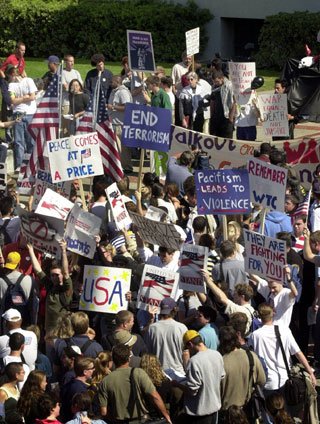Marches and demonstrations
may be the most worthless
thing one can do to further
a social movement.A march is essentially a
large group of people, walking
from one point to the next, with
some sort of opinion, expressed
with chants, handwritten
signs, etc., and this opinion is
being expressed to somebody,
or some large group of people.
Say you take a couple
thousand people. Make it an
even hundred thousand. Now,
take all those people and have
them gather at the same spot,
say in Washington D.C., by one
of the monuments.
What has been accomplished?
Lots of people now
know the opinion of a hundred
thousand people, gathered at
some monument in Washington
D.C.
So what?
What has changed?
What will change?
A congresswoman passing
the demonstration may comment
to herself, “Well, maybe
one of those people is a constituent.”
A senator passing the demonstration
may say, “Well, it’s
doubtful that any of those
people are my constituents.”
Congressmen vote in accordance,
usually, with the
people who placed them in office.
A senator from Nebraska
is not concerned what someone
in North Carolina thinks. That
senator’s time is devoted, primarily,
to satisfying the wishes
of his or her constituents.
In order to make changes
in this system, one must either
become a member of the government,
or part of a political
action committee.
Standing on street corners,
yelling your opinion, will
change nothing, regardless
of how loud you yell, or the
size of your sign.
A problem with
marches is that some
people think they
might work. They
spend all this time
and energy going to
marches, signing petitions.
Okay, quick stop
here. E-mail petitions
might be the only things more
worthless than demonstrations.
If a senator were to receive
one, she wouldn’t look at each
name and think, “Wow, this
issue is important enough for
this person to take 30
seconds out of his day to type
his name at the bottom and hit
send, so I clearly should spend
30 months on it.”
A friend of mine
once said to me, “Jason,
I’m sick of it. I’ve
marched, I’ve signed
petitions, and nothing
has changed. I give up.”
Of course nothing changed.
What really gets
to me about marches
is that one of two
things will typically
happen. Either you will get
jaded and just give up on the
thing, feeling useless and powerless,
or, most despicably, you
will go on with your life, maybe
teach philosophy or English at
some small liberal arts college,
and, when looking back at it,
say that you did your part.
You accomplished nothing.
You went on some field trips.
Your struggle was standing,
hung over, in the rain, in the
capital of the most powerful
country in the world. You
changed nothing. You might as
well have stayed home and
nursed your hangover.
Some people would say
that the civil rights movement
is an example of the power of
marches. If you think the civil
rights movement was primarily
lots of marches, I suggest you
keep quiet and not try to impress
people with your dazzling
grasp of this country’s history.
Some people would point
to the Vietnam War as an example
of the power of marches.
The sheer idiocy of such a
statement is overwhelming.
There was much more to it than
that. The student demonstrations
against the Vietnam War
steeled the will of the American
people against . wait for it …
student demonstrators.
Marches and petitions are
easy. The real difficulty lies in
recognizing what actually has
to be done to effect change in
this country, and this world.
If you really want to make
changes, go to law school. Run
for office. Teach the people of
this country about the issues,
instead of complaining to a
bunch of people who already
think the same way you do.

